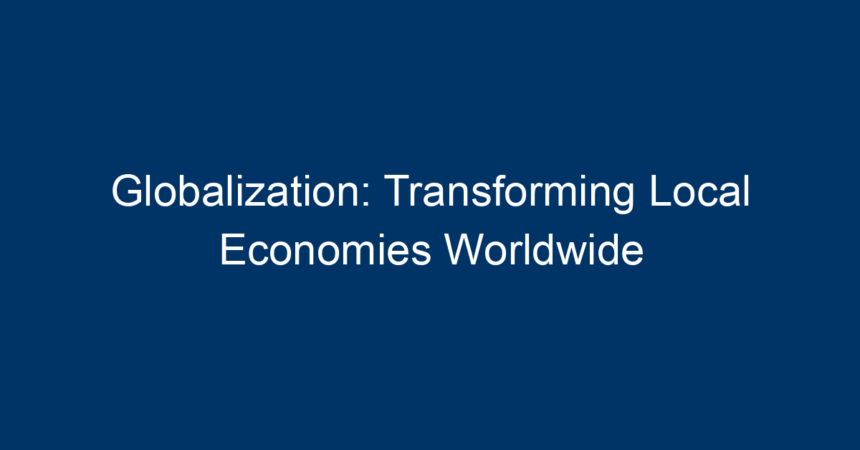Introduction
Globalization is a powerful force reshaping the economies, cultures, and societies around the globe. As businesses expand beyond borders and international trade grows, the effects of globalization are felt in every corner of the world. From small towns to bustling metropolises, local economies are being transformed in ways that are both exciting and challenging. In this article, we’ll delve into the complex dynamics of globalization, exploring its impact on local economies, the opportunities and challenges it presents, and actionable insights for individuals and policymakers alike.
Understanding Globalization
What is Globalization?
Globalization refers to the process by which businesses and other organizations develop international influence or operate on an international scale. It encompasses the global interconnectedness of markets, cultures, and societies. Economic globalization is the most prominent aspect, featuring the movement of goods, services, capital, and labor across borders.
The Evolution of Globalization
Globalization is not a new phenomenon; it has been evolving for centuries. From the ancient Silk Road to modern digital trade, the interlinking of economies has taken many forms. However, the late 20th century saw a significant acceleration in globalization due to technological advancements, particularly in communication and transportation. These achievements made it easier for businesses to reach international markets, resulting in an unprecedented flow of information and resources.
The Economic Impact of Globalization on Local Economies
Increased Trade Opportunities
One of the most visible effects of globalization is the increase in trade opportunities for local economies. Small and medium-sized enterprises (SMEs) can now reach customers beyond their borders, allowing them to tap into global markets. This results in increased revenue, job creation, and overall economic growth.
Example: Local Farmers Going Global
Consider a local farmer who once sold produce only in nearby markets. With globalization, they can now sell directly to consumers worldwide through online platforms. This not only boosts their income but also enhances local agricultural practices, as they adapt to meet international quality standards.
Job Creation and Economic Growth
Globalization often leads to job creation as multinational corporations set up operations in different countries. These businesses require local talent, boosting employment rates. However, the quality of jobs can vary widely, necessitating a focus on skill development and education to ensure that local populations benefit from these new opportunities.
Access to International Markets
Local businesses now have better access to international markets, allowing them to diversify their products and services. This adaptability can stabilize local economies and reduce reliance on traditional sectors. For example, a local furniture maker can export products to countries that appreciate handcrafted items, thereby expanding their market base.
Investment in Infrastructure
Globalization often comes with increased foreign direct investment (FDI) in local economies. This investment leads to improved infrastructure, such as better roads, transportation systems, and telecommunication networks. Enhanced infrastructure not only benefits globalization but also improves the quality of life for local residents.
Challenges Posed by Globalization
Economic Disparities
While globalization brings numerous advantages, it can also widen economic disparities. Larger corporations often dominate international markets, making it challenging for smaller businesses to compete. This can result in local economies becoming overly dependent on a few large employers, leading to vulnerabilities in economic downturns.
Cultural Homogenization
Globalization often leads to cultural homogenization, where local customs and traditions may be overshadowed by global influences. This can result in a loss of cultural identity and heritage, making it essential for local economies to find ways to preserve their unique cultural attributes.
Environmental Concerns
With increased production and consumption driven by globalization, environmental concerns have become paramount. Local economies may face pressure to exploit natural resources in ways that can lead to environmental degradation. Sustainable practices must be prioritized to ensure that economic gains do not come at the expense of the planet.
The Role of Technology in Globalization
Digital Transformation
Technology plays a crucial role in driving globalization. The rise of e-commerce has allowed small businesses to operate on a global scale, reaching customers they never thought possible. Online platforms provide the tools necessary for local entrepreneurs to enter international markets without the hefty investment typically required.
Communication and Networking
The internet has revolutionized communication, enabling businesses to collaborate across borders seamlessly. Social media platforms also play a vital role in marketing products globally, allowing local businesses to tell their stories and connect with a wider audience.
Actionable Insights for Harnessing Globalization
Embrace Education and Skill Development
To fully benefit from globalization, communities should invest in education and skill development programs. As local economies integrate with global markets, workers must possess the skills and knowledge necessary to compete effectively.
Promote Local Entrepreneurship
Encouraging local entrepreneurship can help communities build resilience against the challenges posed by globalization. Providing access to resources, mentorship, and funding can empower local businesses to innovate, adapt, and thrive in a global landscape.
Advocate for Sustainable Practices
Adopting sustainable practices should be a priority for communities engaged in globalization. Policymakers, businesses, and individuals must work together to ensure that economic growth does not come at the expense of the environment. Supporting local sustainability initiatives can help strike a balanced approach.
Foster Cultural Exchange and Preservation
As economies become more interconnected, it is essential to promote cultural exchange while preserving local heritage. Communities should celebrate their unique cultures through festivals, art, and education, ensuring they remain vibrant in a globalized world.
Conclusion
Globalization is a double-edged sword, bringing both immense opportunities and significant challenges to local economies worldwide. By embracing the changes that globalization brings while also addressing its challenges, communities can transform their economies for the better. Education, entrepreneurship, sustainability, and cultural preservation are key areas where action can yield positive results. As we move forward in an increasingly interconnected world, it is essential for everyone—from policymakers to individuals—to take proactive steps in harnessing globalization’s potential while safeguarding the unique aspects of local economies. Through thoughtful action and collaboration, the benefits of globalization can be realized, creating a thriving, dynamic, and resilient global economy.




